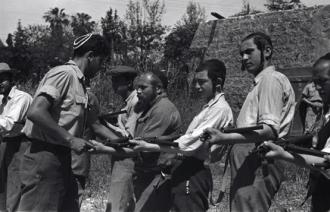There is an ancient masoretic tradition to find a word or name which is numerically equivalent to the number of verses in the weekly portion.
At the end of Behar it records two such parallels. The name חטיל equals 57, the exact number of verses in Behar. It also offers the word לאחוזה, literally translated as ‘holdings’, used nearly exclusively in the context of an ancestral heritage of real estate - land. This exact wording however appears, in its single exception, in association with the ownership of gentile slaves, which is equated with land both in its method of transaction and it being inherited by children.
The more intriguing aspect of this connection is the fact that this word is numerically equivalent to 57 only if it is written with a ו, לאחוזה, when in fact tradition teaches that it must be written without it, לאחזה!
Who was חטיל?
In Nechemiah and Ezra the descendants of Chatil are numbered among the families of gentiles that were part of the cadre of slaves that King Solomon acquired who assisted his prodigious efforts to build his palaces.
Many of these slaves of Shlomo, who became enriched by their efforts and returned with Ezra to the land after the destruction, eventually betrayed the people plundering the Temple and exploiting the Jewish women.
So the connection between these two ideas is now self-evident and relevant to our portion as Chatil was a slave, a ‘holding’ of Shlomo.
But how do we reconcile the added letter ו in this mystical allusion that is not consistent with the manner this word appears in the portion?
Even more puzzling is the fact that the mention of the non-Jewish slave is tangential to the portion within it appears, and not central to the theme of that portion.
Earlier the Torah discusses the appropriate manner in which to treat a Jew who sells himself as a slave. One may not give him demeaning work, emphasizing the limited nature of his contract that allows him to eventually return to his family, and that he may not be treated as chattel that is sold in public auction. The Torah then instructs that one ‘may not subjugate him through hard labor’. This refers to the owner imposing his authority by ordering him to work without revealing the length of time he is to work, or to give him work that is unnecessary, activity merely imposed on him to assert the dominance of the boss.
The Torah later goes on to discuss our obligation to redeem our ‘brother’ who may have sold himself as a slave to a non-Jew, and to assure that while he is in their employ, they don’t abuse him.
Sandwiched between these two discussions the Torah seems to divert by inserting the following verses: Your slave and maidservant you may own, from the gentiles who surround you, from among them you may purchase a slave or maidservant... they shall remain yours לאחוזה, as an ancestral heritage. You shall hold them as a heritage for your children after you to inherit as a possession. (ויקרא כה מג-מד)
Why the sudden detour?
Rashi enlightens by quoting from the Sifra:
If you say, “If so [that I may give my Jewish servant only skilled labor to do,] by whom shall I be served? Over my [Jewish] servants I do not have real power [as I must treat them like hired employees]. Of the seven nations I am not allowed to possess [a slave], for You have warned me, you shall not allow any soul to live, so who will serve me [as a slave]?”
To this, G-d answers: From the nations - They will be slaves for you.
After realizing how limited one is from exacting hard work from his servants, one wonders how one can possibly undertake the difficult task of settling the land, if one can’t employ the intensive menial labor one needs that will remain devoted to the task? To calm this fear G-d assures him that he will be able to avail himself of the inhabitants of the surrounding areas who will be eager to become his slaves.
The question begs though that the issue which is presented immediately prior to this query, which prodded the anxiety, was the inability to compel one’s workers to toil without any end in sight, or to give them purposeless work. Is that ability so critical for success?
Truth is that there are times when a master may need to instill his authority devising false pretensions simply to drive home the message who is boss. Didn’t Sarah implement this strategy as the Torah states, ‘And Sarah dealt harshly with her’, putting Hagar in her place after she displayed a condescending attitude towards Sarah when she discovered she was pregnant?
The Torah understands man’s need to maintain his position of strength preventing his employees from becoming too comfortable. It therefore salves his fear by mentioning the possibility of engaging workers from among the gentile populace who will be happy to serve.
This is a double-edged sword though. A person can easily abuse this ‘privilege’ allowing it to infiltrate into his psyche, extending this attitude even to those closest to him, feeding his ego and distorting his sense of authority.
The Torah therefore reiterates directly after this realization, ‘but with your brethren, the Children of Israel - a man with his brother - you shall not subjugate him with hard labor’.
Rashi teaches here that this is not just a repetition not to mistreat a Jewish slave, but an extension of this principle that encompasses anyone in a position of authority not to impose it by demanding fealty for authority’s sake alone, and to only implement it for the sole benefit of another.
Rabbeinu Yonah takes this even one giant step further in claiming that included within this prohibition is that one may never ask of another to perform a requested task if the only reason he will consent is out of fear or is simply too weak or embarrassed to decline. (שע"ת שער שלישי ס)
The Rambam adds at the very last law in the section of Slaves:
It is permissible to have a Canaanite slave perform excruciating labor. Although this is the law, the attribute of piety and the way of wisdom is for a person to be merciful and to pursue justice, not to make his slaves carry a heavy yoke, nor cause them distress. He should allow them to partake of all the food and drink he serves. This was the practice of the Sages of the first generations who would give their slaves from every dish of which they themselves would partake...
Similarly, we should not embarrass a slave by our deeds or with words, for the Torah prescribed that they perform service, not that they be humiliated. Nor should one shout or vent anger upon them extensively. Instead, one should speak to them gently, and listen to their claims...
Perhaps those masters of the Mesorah sought to intimate that when exercising harsh authority, as in the case of gentile slaves, it is impossible to inculcate healthy attitudes in ourselves let alone in our subjects. Perhaps that is the message in the allusion to Chatil who represents a long line of apparently loyal servants who bucked authority in the end.
Maybe the usage of the fuller לאחוזה, which indicates a ‘holding’, or more accurately ‘control’, is merely an illusion, for in realty it appears in the Torah deficient לאחזה, to teach us that ultimately our greatest control lays in bending our instincts to mirror the attributes of G-d’s kindness. When we exercise that power, the Ultimate Power will provide all the success we need to serve Him, without our interference.
באהבה,
צבי יהודה טייכמאן


















